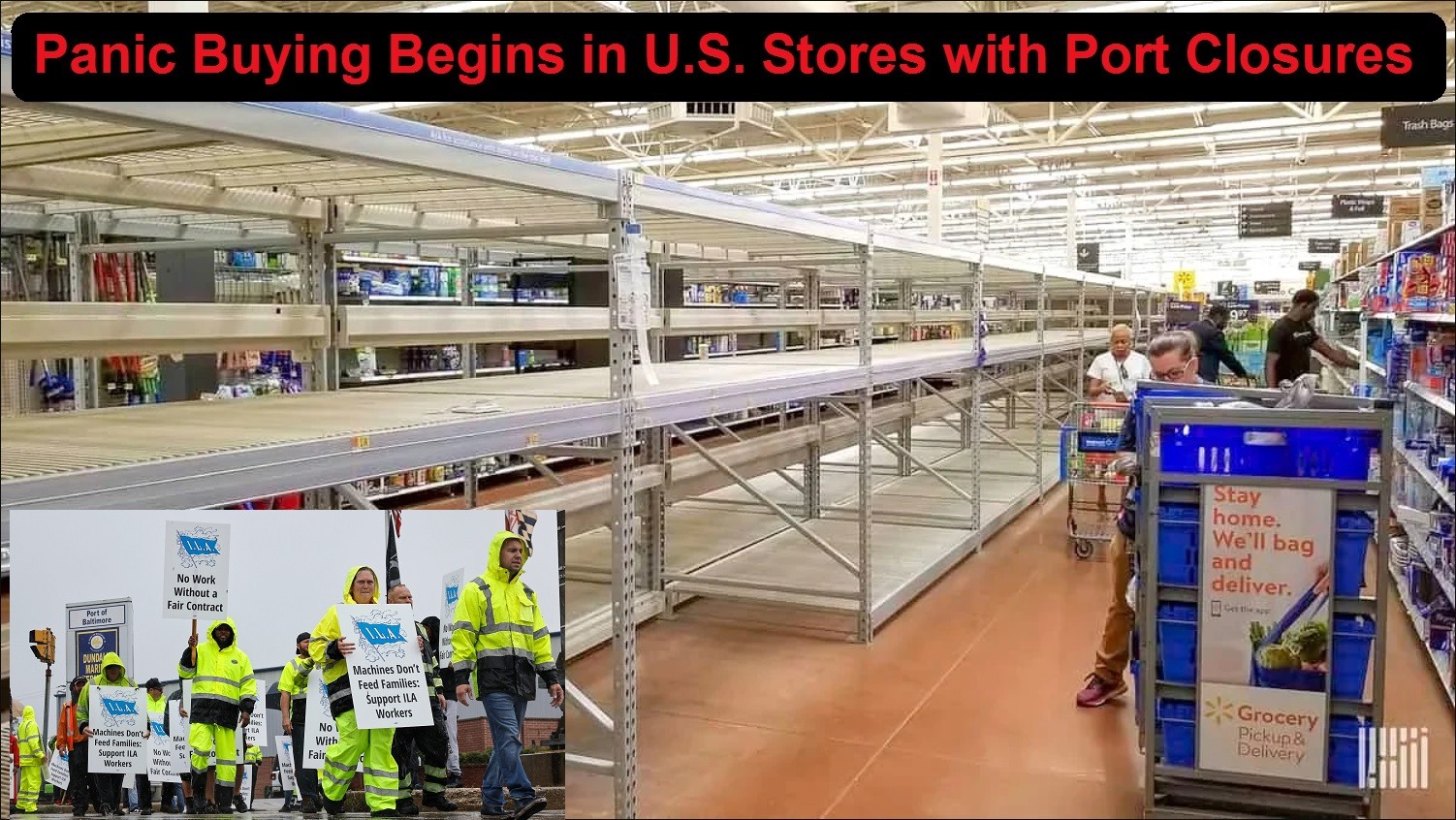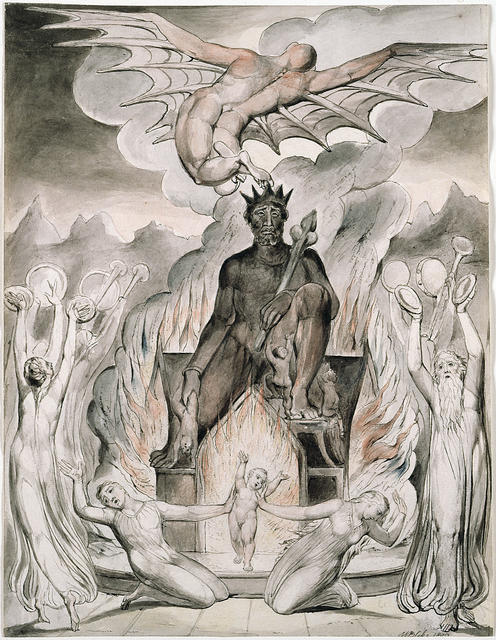by Brian Shilhavy
Editor, Health Impact News
With the United States already suffering major loss of lives and farmland due to Hurricane Helene, and as the war in the Middle East now escalates with Iran starting to bomb Israel today, perhaps the most significant news that affects you RIGHT NOW, is the first day, today, of the dockworkers strike in the eastern and southern United States that has now closed down HALF of the ports in the U.S.
Massive port strike begins across America’s East Coast, threatening shortages and rising prices
New York CNN — Nearly 50,000 members of the International Longshoremen’s Association (ILA) are on strike Tuesday against the nation’s East and Gulf Coast ports, choking off the flow of many of America’s imports and exports in what could become the country’s most disruptive work stoppage in decades.
The strike, which began at midnight, will stop the flow of a wide variety of goods over the docks of almost all cargo ports from Maine to Texas.
This includes bananas, European beer, wine and liquor, along with furniture, clothing, household goods and European autos, as well as parts needed to keep US factories operating and American workers in those plants on the job, among many other goods.
It could also stop US exports now flowing through those ports, hurting sales for American companies.
A wide gap remained between the union’s demands and the contract offer from the United States Maritime Alliance, which uses the acronym USMX. The maritime alliance represents the major shipping lines, all of which are foreign owned; as well as terminal operators and port authorities.
“If we have to be out here a month or two months, this world will collapse,” said ILA President Harold Daggett in an interview with CNN Tuesday morning.
“Go blame them. Don’t blame me, blame them.”
The strike at half of the nation’s ports that started today will cost the U.S. economy about $5 billion a day.
How would a strike affect businesses and consumers?
A strike could cost the economy $5 billion a day, or about 6 percent of gross domestic product, JPMorgan analysts said. More than 68 percent of all U.S. container exports and more than 56 percent of container imports flow through East and Gulf Coast ports, according to the National Association of Manufacturers.
Many businesses would be hurt by a walkout because lots of raw materials — wood and cotton, for example — pass through these ports. Most imports of pharmaceutical products carried in containers flow through the affected ports. And a wide variety of food shipments pass through the East and Gulf Coast ports. (Source: NYT)
With stores and gas stations still closed in North Carolina and Tennessee due to the devastation caused by Hurricane Helene, it is being reported that panic buying is now beginning in stores in other parts of the U.S. today.
Panic-buying already spreading as ILA dockworker strike gets underway
As union dockworkers began striking against employers at East and Gulf Coast ports early Tuesday morning, reports of panic-buying at supermarkets almost immediately started spreading across social media.
Video clips posted by social media users on X and Facebook showed people rushing to buy water, toilet paper, paper towels and other items at supermarkets and retailers across the U.S.
“Are people already panic buying because of the Port Strike? Here are the grocery shelves in the water section at my local Kroger this morning. I realize that we are probably also low on water due to the Helene aftermath in East Tennessee, but still not great to see this already,” photographer and author Denise Van Patten posted in a social media video clip on X.
Micheal Coker posted on X, “Well the panic buying is in full swing in my little town in South carolina. Sam’s at 8:30 a.m., no water. Same at Walmart and grocery stores. Next will be toilet paper.”
A prolonged strike could cause major disruption to the domestic supply chain, according to American Farm Bureau Federation Economist Daniel Munch.
“For international destinations, waterborne exports are vital to us farmers,” Munch said in a podcast on Thursday.
“They make up over 75% of total U.S. agricultural export volume. The potential strike that we’re looking at would mainly disrupt containerized agricultural exports, which account for 30% of U.S. waterborne agriculture exports by volume. The remaining 70%, often grains and oil seeds, are shipped via bulk carriers, which are usually managed by independent workforces and will not be affected by the strike.”
He said U.S. farmers could be particularly vulnerable to a strike that lasts a week or more.
“The strike could have disastrous impacts on U.S. agriculture, depending on how long it lasts,” Munch said.
“The disruption to overall agricultural trade is expected to be about $1.4 billion each week that a strike is in place. When we think about what commodities are at risk, nearly 80% of waterborne exports of poultry leave East Coast ports, 56% of raw cotton, 36% of red meat, 30% of dairy products and even 6% of soybeans all go through those ports, through containerized exports. Not having an outlet to move those goods will create supply surpluses domestically and reduce prices for farmers.”
The top retailers that could be affected by the work stoppage at the ports are Walmart, Ikea, Samsung and Home Depot, according to data from ImportGenius and Arbor Data Science. (Full article.)
Went to Costco to get a few things at 10:30. We were low on paper towels and TP. Noticed parking lot was full. Saw people walking out with carts full of paper goods.
I went in with the intent of getting one pack of towels and one of TP. Nay nay Nasty Butt! The aisle was empty. Associate told me people were waiting in line when they opened.
She said some people had 10 packs of TP! Costco sized packs!!!!!
All because of a strike that started at midnight. (Source.)
This is also going to affect my own store, Healthy Traditions, as we have two containers scheduled to arrive from Chile within the next 30 days, our world-class raw Andes Mountain honeys, and our Chilean Extra Virgin Olive oil, which we bring through the Port of Houston from Chile, in route to our warehouse in Texas.
With more bad weather on the way that could affect the same areas still searching for survivors in the Appalachians, and with the war escalating not only in the Middle East, but also in Ukraine and potentially soon in the Pacific, with the very real possibility that there could be attacks on U.S. soil, you don’t need me to warn you that NOW is the time to stock up on water and food and try to have an alternative energy source.
Even if we don’t see major food shortages, the prices are absolutely going to start climbing at some point, from their already high pricing currently.
Related:
Hundreds Dead Thousands Missing in Appalachia from Hurricane Helene While National Guard is Deployed to Israel Instead
Comment on this article at HealthImpactNews.com.
This article was written by Human Superior Intelligence (HSI)
See Also:
Understand the Times We are Currently Living Through
New FREE eBook! Restoring the Foundation of New Testament Faith in Jesus Christ – by Brian Shilhavy
Who are God’s “Chosen People”?
KABBALAH: The Anti-Christ Religion of Satan that Controls the World Today
Christian Teaching on Sex and Marriage vs. The Actual Biblical Teaching
Exposing the Christian Zionism Cult
The Bewitching of America with the Evil Eye and the Mark of the Beast
Jesus Christ’s Opposition to the Jewish State: Lessons for Today
Identifying the Luciferian Globalists Implementing the New World Order – Who are the “Jews”?
The Brain Myth: Your Intellect and Thoughts Originate in Your Heart, Not Your Brain
What is the Condition of Your Heart? The Superiority of the Human Heart over the Human Brain
The Seal and Mark of God is Far More Important than the “Mark of the Beast” – Are You Prepared for What’s Coming?
The Satanic Roots to Modern Medicine – The Image of the Beast?
Medicine: Idolatry in the Twenty First Century – 10-Year-Old Article More Relevant Today than the Day it was Written
Having problems receiving our emails? See:
How to Beat Internet Censorship and Create Your Own Newsfeed
We Are Now on Telegram. Video channels at Bitchute, and Odysee.
If our website is seized and shut down, find us on Telegram, as well as Bitchute and Odysee for further instructions about where to find us.
If you use the TOR Onion browser, here are the links and corresponding URLs to use in the TOR browser to find us on the Dark Web: Health Impact News, Vaccine Impact, Medical Kidnap, Created4Health, CoconutOil.com.





















